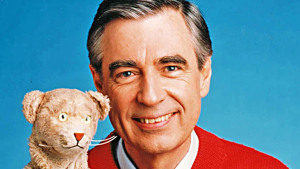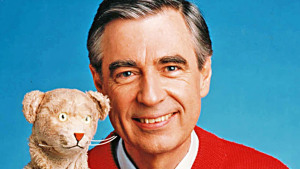 When my oldest child was three, friends with a son about the same age asked how I liked Sesame Street. I admitted that neither I nor my daughter had seen it. We rarely turned on the television, but after hearing other young parents extolling the show’s merits, I watched. The constant fast pace and short snippets put me off. (A former elementary teacher as well as a mother, I knew kids had longer attention spans than that.) Later, I came to appreciate what the show had to offer, and Sesame Street and other public television shows became common fare. But at first, if we were going to watch children’s television at all, I preferred Mr. Rogers.
When my oldest child was three, friends with a son about the same age asked how I liked Sesame Street. I admitted that neither I nor my daughter had seen it. We rarely turned on the television, but after hearing other young parents extolling the show’s merits, I watched. The constant fast pace and short snippets put me off. (A former elementary teacher as well as a mother, I knew kids had longer attention spans than that.) Later, I came to appreciate what the show had to offer, and Sesame Street and other public television shows became common fare. But at first, if we were going to watch children’s television at all, I preferred Mr. Rogers.
“Preaching” with his life
It was the pace. The real time. Taking time to let a story unfold without interruption. And the calm kindness and grace of Mr. Rogers himself.
After delaying seminary training to work in the new field of television, he eventually was ordained a Presbyterian minister to be an evangelist to children through the media. But Fred Rogers was no televangelist.
While St. Francis of Assisi probably never uttered the admonition attributed to him, instructing his followers to preach at all times and to use words if necessary, those words come to mind when I think of Mr. Rogers. His faith was integral in his life and it informed every show. But when the cameras rolled, he didn’t mention Jesus or make religious statements. Who he was, what he did, how he spoke to his young audience, how he reverenced all (each child and of course all the “neighbors”) spoke right to heart.
Tikkun Olma
On the one-year anniversary of 9/11, he came out of retirement briefly to record a public service announcement addressing parents about how to talk with their young children about such tragedy and violence. Like the rest of us, he wondered what he could do in the face of such overwhelming evil.
With pain and sorrow in his face, he reminded parents to reassure their children that they would do all they could to keep them safe. He recalled his mother’s words: “When I was a boy and I would see scary things in the news, my mother would say to me, ‘Look for the helpers. You will always find people who are helping.’”
He looked at the camera and said we are called to be tikkun olma, a Hebrew phrase that means “repairers of creation.” It includes the sense of cooperation with God in mending the world, restoring it to wholeness.
You are special. So is everyone else.
In today’s world, those words are powerful. Rogers had spent his life using his particular gifts and grace to help children understand they were loved, each a special, unique creation cherished by God. He was acknowledging a foundational truth of Christianity: God dwells in each of us. We are all loved and carry a spark of the Divine within.
The Hindu word Nameste says it: The divine in me bows to the divine in you. Acknowledging this truth about ourselves and others makes atrocities like separating immigrant children from their parents unthinkable. Judging others to be less than because of skin color, ethnicity, social standing, or education cannot stand when we recognize the dignity of all.
In an interview for Christianity Today, Rogers said “The underlying message of the Neighborhood is that if somebody cares about you, it’s possible that you’ll care about others. ‘You are special, and so is your neighbor’—that part is essential: that you’re not the only special person in the world. The person you happen to be with at the moment is loved, too.”
Today we desperately need to heed the gospel message of “love your neighbor” and the Good Samaritan parable’s understanding of just who our “neighbors” are. Mr. Rogers spent a lifetime being that neighbor to millions of young children and their parents.
Be a helper. Be tikkun olma. And if you have the opportunity, treat yourself to the movie, “Won’t You Be My Neighbor.”
©2018 Mary van Balen Originally published in the Catholic Times, July 15, 2018

Thank you for your insight, Mary. During this ominous time when our country has lost its way, seeing the film about Fred Rogers is uplifting. To know of him is to know of a true hero who showed us how to put love into action.
Yes, he was a true hero, a tikkun olma. His life gives hope that each person, doing good and truly caring about their neighbors, can make a difference. Your work with Columbus Crossing Borders is a good example. Thank you, Laurie.
Thank your for your lovely review of a quiet, and powerful, documentary about one exemplary life. We loved it, and we loved Fred Rogers.
The documentary helps me remember that good people, living good lives are making a difference. Thanks Anne.
Love this reflection Mary! So thoughtful and very well-written. thank you once again for “getting it” so well and sharing that.